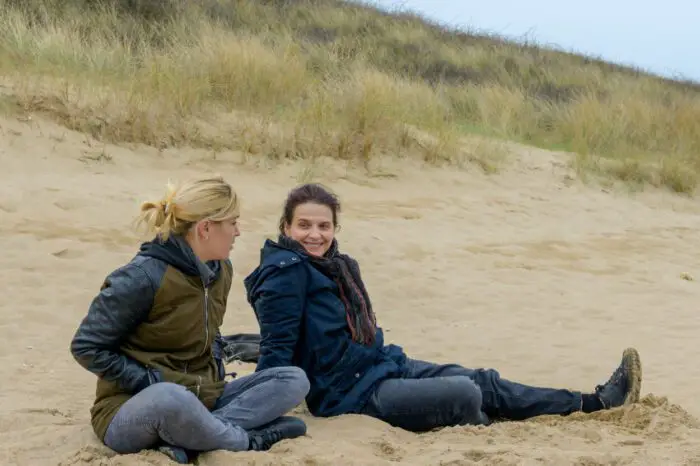The harried, overworked, underpaid cleaning workers who befriend the character played by veteran French actress and Academy Award winner Juliette Binoche in Between Two Worlds take it on faith that Binoche’s character is who she says she is: a divorced housewife with no work experience hoping to land a gig in an economy plagued by a recession and openly misogynist in its structure. But Binoche’s “Marianne” is actually an accomplished writer whose undercover mission to document the exploitation of workers is one that depends upon a ruse: she’s pretending to be a gig worker to complete her planned, upcoming book.
What does she, the writer, owe her subjects?
Even with a major star like Binoche in the lead and onscreen every moment of the film, Between Two Worlds never loses sight of the thorny ethical questions that challenge such a project. And as the narrative progresses, taking Marianne deeper and deeper into the can’t-make-a-living-wage economy and the people she befriends there, the film, to its credit, continues to poke and prod at Marianne’s ruse with every step. Is she, too, exploiting the exploited to tell her own tale?
Between Two Worlds is a loose adaptation of the bestselling book The Night Cleaner by Florence Aubenas, who hand-picked the director and co-wrote the screenplay, essentially at Binoche’s persistent requests. Aubenas, an internationally-known French journalist whose reportage at one point saw her captured and held hostage for five months by Iraqi insurgents, based her bestselling book on her own undercover experiences during France’s worst recession since the Great Depression. While Binoche lobbied for the lead, Aubenas agreed to have the film adapted only if Emmanuel Carrère, one of the country’s best known authors of literary nonfiction, would direct; Between Two Worlds is his first film since 2005.

Binoche’s Marianne Winckler is likewise a writer of some renown in Between Two Worlds. To investigate the exploitation of workers without job security at the height of the economic crisis, she seeks employment coaching and finds herself, after a time, landing a job as a night cleaner on a high-end ferry that crosses the English Channel. Doing so means befriending others sharing that same plight, including the charismatic, down-on-his-luck bachelor Cédric (Didier Pupin) and a set of new female comrades-in-arms, especially single-mom-of-three Christèle (non-professional actress Hélène Lambert, nominated for a César), whose curt, standoffish demeanor masks an empathetic soul.

The closer she gets to those consigned to society’s lowest class, the greater Marianne’s project is at risk. She and Christèle bond, despite their very different demeanors, but while Marianne needs to learn more about her subject she can’t let her new friend learn to much about herself. At each step, the narrative lays out Marianne’s dilemma as an investigative journalist, in a story-structure that, as the benign, generic title indicates, basic Hero’s Journey stuff: the protagonist must venture into a new land, where she finds friends and enemies, learn special talents, face danger, and, ultimately, return home victorious, while the contrast between the two worlds is highlighted for effect.
Those well-established story beats, coupled with Binoche’s winning performance as the reserved-but-driven Marianne, make Between Two Worlds an affecting drama. You just have to suspend disbelief that the universally recognizable Binoche can convincingly play undercover as a low-wage cleaning worker (and that the characters in the film have never seen Three Colors: Blue, The English Patient, or Chocolat). With her character at the center and always onscreen, the film never really tells the story of the exploited workers it seems to wish to.
In contrast, the recent Netflix limited series Maid, adapted by Molly Smith Metzler from Stephanie Land’s memoir Maid: Hard Work, Low Pay, and a Mother’s Will to Survive, is one example of a story that more directly belongs and focuses on that of the exploited worker. But Maid is a tale that can be told only because its author found her way from those low-rent gigs to a college writing program. Between Two Worlds isn’t really a story about the exploitation of the lower class; rather, it’s a story about its protagonist’s ethical dilemmas as she undertakes a project about those people, one of whom she will never become.
That’s a point Between Two Worlds drives home in its final act. Ultimately, Marianne cannot be both a lower-class servant who is friends with others in her station and a famously successful investigative journalist. She must choose between them, as her forthright friend/acquaintance Christèle demands. It’s a moral dilemma, one worthy of our attention, but it’s also one Marianne has the agency to determine, entirely of her own accord, in a way her workmates will never enjoy.
Binoche is excellent as the thoughtful journalist who cannot help but come to love her new friends while she loathes their exploitation. She can convey a great deal with a simple eyebrow raise or shoulder shrug, and Carrère’s careful direction lets the visuals tell much of the story, as when a new boss of Marianne’s blithely trudges mud across a floor she’s just scrubbed to chastise her for her slow work. And as Christèle, Lambert channels no small amount of anger with her closed arms and steely glare, only to open up to Binoche’s character as the two grow closer.

Between Two Worlds tackles a plight similar to that of another recent French drama, the pulse-pounding Full Time staring Laure Calamy, a genre-bending film that employs the tropes of the spy thriller to the story of a similarly downtrodden cleaning woman (not a writer pretending to be one). There too, in Full Time, making ends meet with any degree of dignity on a cleaning woman’s small salary was an impossibility. In its own way, though with a very different protagonist and an entirely different cinematic storytelling style, Between Two Worlds conveys a similar—and absolutely necessary—theme: that the working women of the world suffer a set of injustices in dire need of correction.
Between Two Worlds opens Friday, August 11 in New York and Los Angeles, followed by a national expansion. 106 minutes, in French, with English subtitles. A Cohen Media Group release.



